Some years ago I hunted moose in British Columbia with an old Indian who was a skilled and savvy woodsman when it came to moose as well as other big game species. It was a beautiful blue sky day with a brisk breeze that pushed the high clouds along in rapid fashion. A large low-lying bank of fog hovered over the spruce forest several miles away.
We were glassing for moose in a willow bottom a half mile distant. My guide said it was a prime place and in fact he’d guided a half dozen clients to moose in that spot. Presently he spotted a bull moose feeding in the willows. Soon I spotted another - each having antlers about 40 inches wide. They were legal, and since I was on a meat hunt I wasn’t interested in big antlers. These moose were representative of the bulls in the area.
With the wind in our favor we eased toward the bulls. If all went well we’d be able to make it to a small ridge 150 yards away from the quarry. Importantly, the higher elevation of the ridge would allow us to look down into the willows that otherwise could effectively hide the moose.
We were slowly inching along when we realized the fog bank was moving toward us. Very quickly it had covered the entire willow bottom. The moose vanished in the thick fog. As we waited, my guide and I made small talk. He said that at times the fog hangs on all day and hoped today it would waft away soon. At one point he said, “there are many virtues the hunter must have in order to be successful, but one is far more important than the others. Can you guess what it is?”
He sat in silence, leaving me to ponder the question. I had several answers: knowledge of the quarry’s habits and behavior, knowledge of the country, ability to negotiate rugged terrain, ability to shoot, and many others.
My guide smiled and looked at me, slowly shaking his head as I reeled off what I thought was most important.
“Patience,” he said.

I thought about that. He had a point. How many times had I become bored or skeptical about a spot and left too soon? I pondered more about being patient and realized that’s exactly what we were doing — waiting for the fog to move. He said we had an option to leave and hunt higher in another area that was above the fog.
The old guide made himself comfortable, making a temporary bed of grass and settling his head on soft moss clinging to an old stump. Evidently, we were going to wait. After two hours I was getting impatient. It seemed like the fog would never leave. Finally, I could see some willows in the distance. The fog was dissipating. I grabbed my binoculars and trained them on the willows. My guide did likewise. The bulls were no longer visible, as expected. They’d no doubt bedded in the shrubs.
Moments later my guide tapped me on the shoulder and pointed. I saw what he was looking at - the broad palm of one of the bulls. He was lying in high willows in a position where there was no way to get a bullet into his vitals.
“We wait,” my guide said. “He’s lying in the hot sun now and soon he should get up and walk back into the shade where he’ll bed again. Be ready.” More patience, but I knew we were doing the right thing.
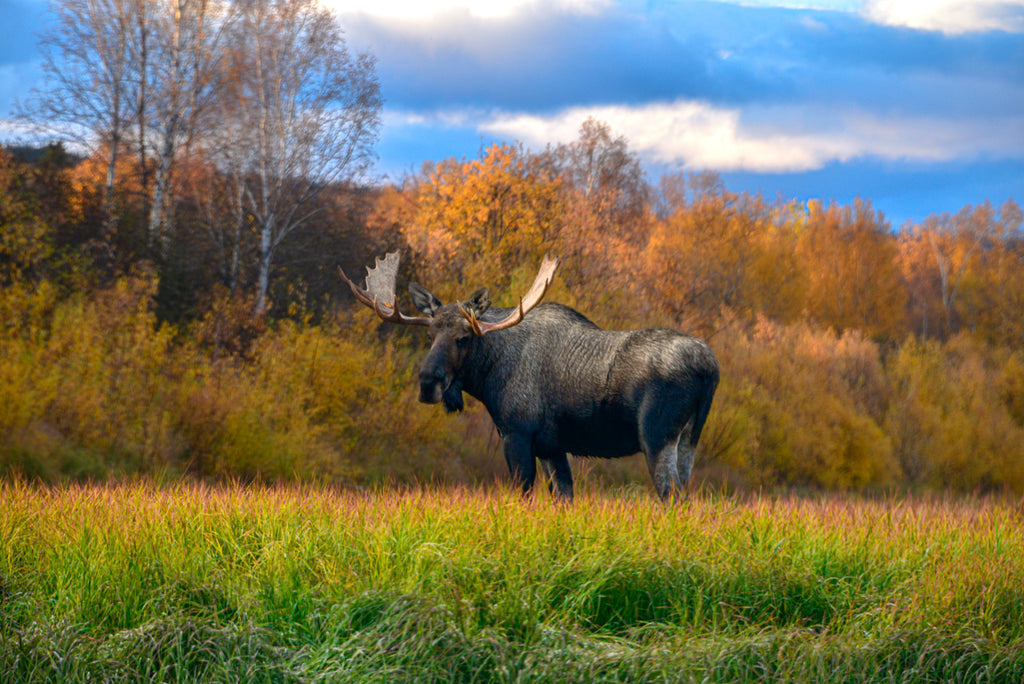
A half hour later the bull rose, chewed on a tender willow twig, and took a step to a shaded area. He offered a broadside shot with no branches between us and I took the shot. One less moose in Canada. There was no question about it. The waiting game paid off.
I’m certain that everyone who has spent time in the woods has been guilty of leaving a spot prematurely, then learning that if they had waited just a little while longer, they’d have scored.
I remember sitting in a clump of brush in Iowa hunting spring turkeys. I was watching a giant bird that we dubbed “the ostrich.” He was cavorting with a bunch of hens and though I tried every call I had he wouldn’t look at me. The turkeys were in the middle of a field on a property where we couldn’t hunt. I was hoping to call him onto the farm I was hunting. As the day wore on the birds drifted off over a hill. I stubbornly kept calling, then pulled out a sandwich and ate my lunch. Then I figured I’d take a short nap. Afterward, I called more and then decided to give it up. Instead of slowly turning my head to check out the surroundings I stood up and was startled to see “the ostrich” flush in a mighty explosion. My gun was still lying on the ground and I watched helplessly as I saw that impossibly long beard hanging down as he flew. Had I sat there another 10 minutes that bird might have walked out beside me well within range. The big problem is knowing when to leave and when to stay. In that case it was a coin flip. Sometimes decisions must be made quickly.
The most unbelievable waiting game I ever experienced, ever, occurred when I was hunting Osceola turkeys in Florida with the late Lovett Williams out of his famous camp called Fish Eatin’ Creek. Lovett was a legend in the world of turkey hunting. He had a Doctoral Degree in Osceola turkeys and was the acknowledged master hunter.

Here’s how the hunt went. We left camp in a Jeep and crashed through palmetto trees, sounding like a herd of elephants. It was pitch black dark when we got out of the Jeep and listened for roosted birds. After several minutes we heard gobblers very far away. Lovett took off through the vegetation, not in the direction of the birds, and I followed. Evidently, he had a plan. Soon we stopped at the edge of a dried pond. I could barely see it. He motioned us to sit. I got comfortable and hoped I wasn’t sitting next to a rattlesnake or a nest of chiggers. Lovett used a wingbone call consistently. Unlike other calls you must suck on the call to imitate a hen turkey. After a half hour we never heard another gobbler. In fact, other than the birds we heard when we left the Jeep, we never heard a single gobble. Another full hour passed. We continued to sit, glued to that spot. Then Lovett whispered, “my mouth hurts.” After blowing that call so long I wasn’t surprised. I wanted to move and take a walk to try to get a tom to gobble but I had too much respect for Lovett. I didn’t want to offend him by suggesting he was doing anything wrong. It was right at 10 o’clock when Lovett suddenly whispered, “two birds to our left.” I very slowly turned my head and saw two longbeards 25 yards out. I waited until they pecked around on the ground and eased my shotgun to my shoulder. I selected the biggest bird, aimed at his neck, and squeezed the trigger. The turkey was hit well, flopped around a few seconds, and laid still. I couldn’t believe it. Those toms came in without a sound. We had no decoys to lure them in. About four hours had passed since we sat down. Though I had a case of cramped muscles I got up from my now uncomfortable position and walked out to see my prize. It was my first Osceola. Lovett demonstrated an amazing technique which required only one thing - patience. A lot of patience. More than I’d ever seen in the turkey woods on my hunts around the country.
Understanding that patience is important is key to making yourself wait. For example, I hunted cow elk with two buddies in Wyoming recently. One was a nonresident; the other was a rancher who knew the area where we were hunting. I didn’t have a tag. I had killed an elk earlier elsewhere in Wyoming and I was along as a helper and cheerleader. The rancher drove his pickup truck into the snowy mountains, pulled out on an overlook, turned the key off and made himself comfortable.
“What’s the game plan?” I asked. “We’re gonna sit tight,” my friend said. “Elk should be coming out of the timber to feed down in that draw just before dark. Have a cup of coffee.”
We sat there for more than two hours. I’m not much of a sitter. I always want to see what’s over the next ridge. We drank coffee, ate sandwiches, and my rancher buddy started the truck every half hour to warm up the cab. I was totally positive this wasn’t going to work. It didn’t. Shooting light ended and we never saw an elk. We were hunting a national forest which was problematic. Other hunters could have been moving elk around, and not where we were observing.
The next day was a repeat of the first. Again, we sat at the overlook. My rancher pal was a long-time friend. I was clamoring to say something, but I didn’t. He knew the country and the elk that inhabited it.
Two hours later I was half dozing when my friend said, “elk!” I looked to see a small herd draining out of the timber, precisely where they were supposed to. As soon as they disappeared into the draw my pals eased out of the truck. They’d approach the edge of the overlook and be within 150 yards from the elk.

How sweet it was. Two shots and two elk. I was seriously impressed. Their success was entirely due to patience as well as knowledge of elk and the country.
Patience is also important (and sometimes tough) when you’re hunting elk deep in the mountains and your afternoon game plan is to sit near a meadow where you’ve found fresh elk sign. You intend to wait until shooting light is over, hoping elk will enter the meadow. But as the shadows lengthen you have second thoughts. Camp is a long hike away and you’re not terribly excited about walking around the woods in the dark, so you leave early. Not all hunters are uncomfortable in the dark woods but many are (especially where I live in northern Wyoming where there are grizzlies and wolves in the woods). The ones that hang in are often rewarded with an elk. Patience made it happen.
Tree stand hunters know all about patience, especially when the weather is bad. I remember several whitetail hunts in Saskatchewan when the temp was 20 below. It was an ordeal to sit in a stand, but as the old saying goes, “you can’t kill a deer if you’re sitting in camp.” Being comfortable is of paramount importance. If you’re half freezing to death, you’ll be unfocused and thinking only about getting out of the woods. And finally, you need a certain degree of confidence and the right attitude in order to have patience. It’s always best to think your glass is half full rather than half empty. Optimism works.


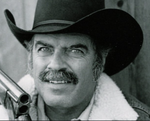





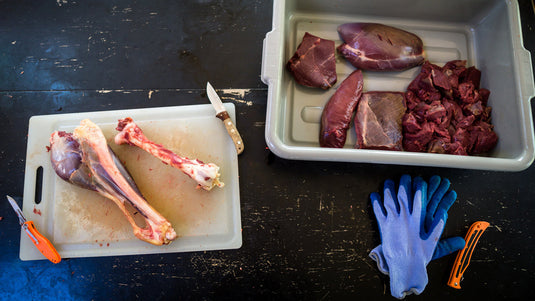
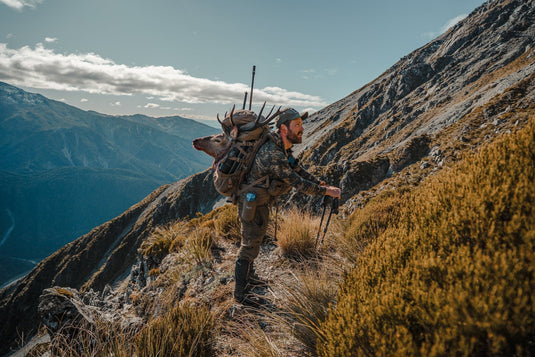
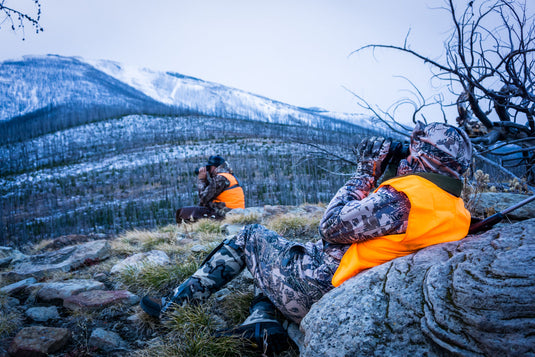
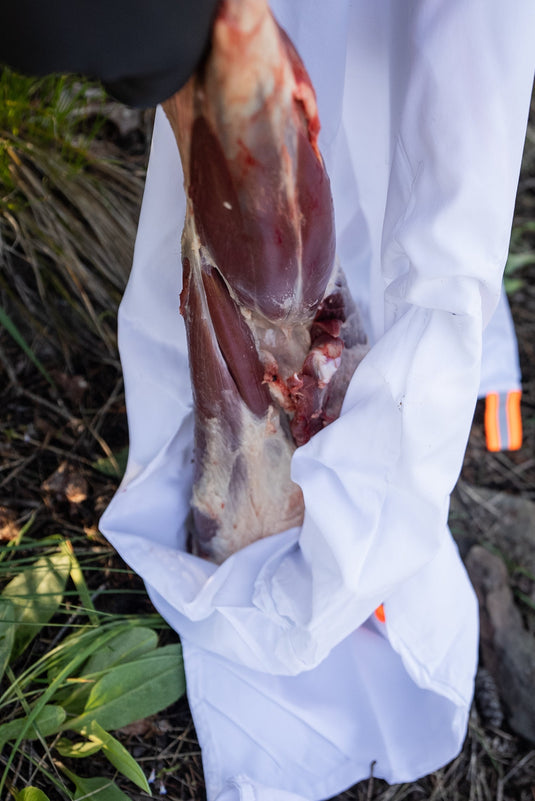
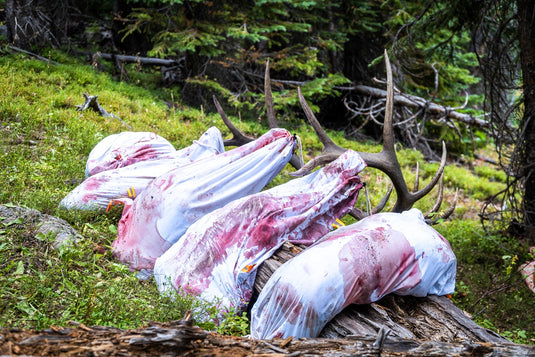
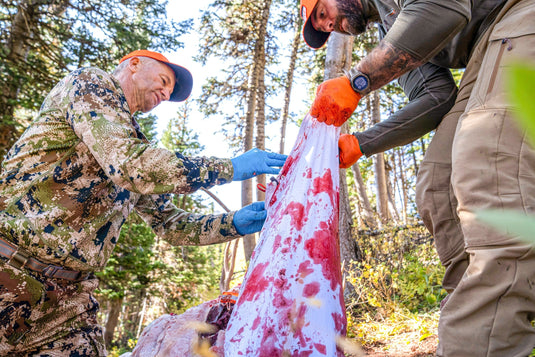
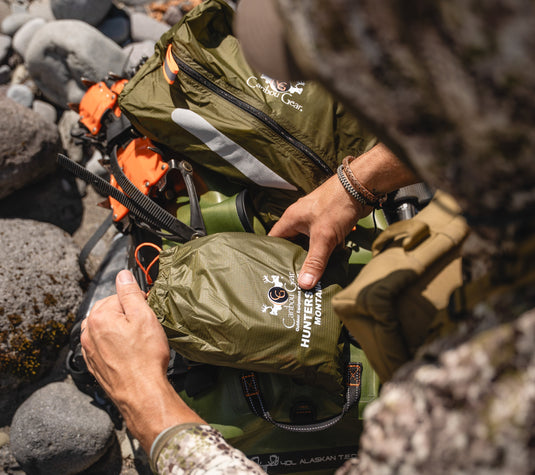
Great stories and a fantastic moral!
I always enjoy reading Jim’s stories. Caribou Gear made a wise choice for their blogger.